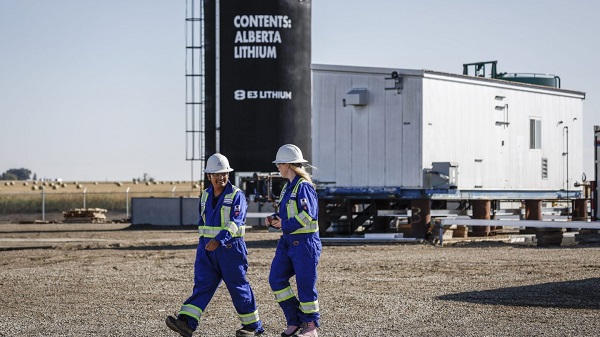Automotive
Governments in Canada should get out of EV business as Trump pulls the plug

From the Fraser Institute
Lee Zeldin, administrator of the U.S. Environmental Protection Agency (EPA), recently announced that the EPA will scrap a 2009 Obama-era “Endangerment Finding” that held: “The Administrator finds that the current and projected concentrations of the six key well-mixed greenhouse gases—carbon dioxide (CO2), methane (CH4), nitrous oxide (N2O), hydrofluorocarbons (HFCs), perfluorocarbons (PFCs), and sulfur hexafluoride (SF6)—in the atmosphere threaten the public health and welfare of current and future generations.”
After its 2009 enactment and 2016 reaffirmation, according to the U.S. Congressional Research Service, the Endangerment Finding would be the legal rationale to set greenhouse gas (GHG) emission standards for cars and light trucks, power plants, and facilities in the oil and gas sector.
There will no doubt be legal challenges to the Trump administration’s decision to terminate the finding (as there seemingly is for everything Trump), however in the event that it proceeds (and it likely will), one can expect to see the elimination of a fair number of large-scale environmental regulations that could have ripple effects on the Canadian economy.
From a Canadian perspective, the most important aspect of the repeal is that it will likely lead to the complete withdrawal of the U.S. federal government’s support of vehicle electrification. The Trump administration has already killed electric vehicle (EV) mandates and federal subsidies for the purchase of EVs, but remaining production mandates for car companies (under the guise of EPA fleet fuel-economy standards) are also likely to end, and with that, EV manufacturing and sales will likely plummet. This will leave EVs in the niche they’ve held—novelty items for hobbyists or luxury toys for well-heeled eco-virtue signallers. And California can’t bail this one out—its own authority to set more stringent environmental standards for vehicles emissions has also been terminated, along with its ability to drive the EV revolution forward.
So, policymakers in Canada should shelve (or drop into the round file) any expectation of exporting significant EV-related goods into the U.S. market. At the least, governments should suspend or eliminate Canadian EV sales mandates and “investments” based on an expected U.S. market for such goods, unless governments want to give taxpayers a soaking.
The federal government, and some provincial governments, may choose to continue supporting vehicle electrification within Canada and the creation of export capacity for EV parts and components (such as batteries) outside of the U.S. market for any number of reasons. They might justify this support based on concerns over air quality or GHG emissions. However, the logistics of such endeavours, particularly tech sales out of North America, would be daunting. EV components tend to be heavy, require exotic materials and long costly shipping lines to Europe, Asia and points abroad. And planning to sell EV components to Asia is like preparing to sell ice to the Inuit or carrying coal to Newcastle.
Canada’s vehicle electrification fixation has been dubious from the start, much like the U.S. fixation, due to the vast transport distances, rugged topography, inadequate and unaffordable battery tech and charging capacity, and in some precincts, a great deal of cold weather.
But whether one agrees with the death of the Endangerment Finding or not, a pragmatic observer should recognize that, for the next good while at least, the United States is pulling the plug on North America vehicle electrification and subsequently any expectations of profit from the previous EV regulatory milieu. For Canada, I’d argue, that means killing the EV mandate and cancelling/trying to claw back as much of the government’s “investments” in EV and EV battery technology and manufacturing as quickly as possible.
Automotive
Big Auto Wants Your Data. Trump and Congress Aren’t Having It.


From the Daily Caller News Foundation
Congress is not going to allow Big Auto to sideline consumer privacy and safety while getting subsidized massively by the federal government.
That is because, in late September, by an overwhelming vote of 50 to 1, Chairman Brett Guthrie’s (R-KY) House Energy & Commerce Committee joined the Senate Commerce, Science, and Transportation Committee in passing the AM Radio for Every Vehicle Act.
This legislation is in response to some automakers removing AM radios from new model vehicles despite pleas from America’s public safety community not to do so.
Dear Readers:
As a nonprofit, we are dependent on the generosity of our readers.
Please consider making a small donation of any amount here.
Thank you!
“They’d rather force consumers to use their infotainment devices — which collect and sell their third-party data — than protect American lives,” Corey Lewandowski, President Trump’s 2016 campaign manager and senior adviser to his 2020 and 2024 campaigns, stated.
The entirety of America’s public safety community spanning the federal, state, and local levels, insists AM radio remaining in cars is critical for protecting the nation’s emergency alerting systems. These systems rely heavily upon AM radio, the only communication method that has stayed reliably accessible during many disasters such as the Sept.11 terrorist attack and major disasters like Hurricanes Katrina, Sandy, and most recently, Helene.
Brendan Carr, the current chairman of President Trump’s FCC, nominated by President Trump, has also endorsed the AM Radio for Every Vehicle Act. In a statement, Carr said that “millions of Americans depend on the value of AM radio and the local news that AM broadcasters offer in communities across the country.” He also recounted hearing firsthand stories of Hurricane Helene victims who “could only access lifesaving information in the days following the storm by tuning into their AM radios.”
AM radio also serves another purpose that the elites in Silicon Valley and Detroit often forget: it keeps rural and working-class America connected. Millions of people outside the big cities rely on AM for local news, farm reports, weather alerts, and even community events. For many small towns, AM stations are a lifeline—far more reliable than expensive streaming services or spotty cell coverage. Pulling it out of cars is yet another way of telling Middle America: “you don’t matter.”
Of course, no good idea in Washington is safe from special interests.
Despite the broad support within Congress, the administration, and throughout the public safety and first responder communities, the bill has faced a full-court press by the musicFIRST Coalition — a group backed by the Recording Industry of America — to tank the legislation unless it is tied to unrelated music royalty reform legislation. That’s cronyism politics at its worst—holding public safety hostage to squeeze out another payday.
However, now that the AM Radio for Every Vehicle Act has passed both committees by overwhelming margins, the only stop left for the legislation is the House and Senate Floor — meaning Speaker Mike Johnson (R-LA) and House Majority Leader John Thune (R-SD) must call it up for a roll call vote.
At the heart of this fight is more than just whether a radio dial stays in your dashboard. It’s about whether Americans can trust that their safety won’t be sacrificed for corporate profit.
It’s also about data privacy. Automakers and Big Tech are eager to funnel drivers into infotainment systems that monitor every move, harvest personal information, and sell it to the highest bidder. AM radio doesn’t spy on you. It doesn’t crash when the grid goes down. It doesn’t put profit ahead of people. It just works.
For the sake of both public safety and personal freedom, Congress should make sure it stays that way.
Ken Blackwell (@KenBlackwell) is an adviser to the Family Research Council and a chair at the America First Policy Institute. He is a former Mayor of Cincinnati, Ohio, Ohio Treasurer and Secretary of State, and U.S. Ambassador to the United Nations Human Rights Commission. He is also a former member of the Trump transition team.
Automotive
Canada’s EV subsidies are wracking up billions in losses for taxpayers, and not just in the auto industry

By Dan McTeague
To anyone who thought that the Liberals’ decision to postpone enforcement of their Electric Vehicle (EV) mandate by one year was part of a well-thought-out plan to get that disastrous program back on track, well, every day brings with it news that you were wrong. In fact, the whole project seems to be coming apart at the seams.
Here’s the latest crisis Mark Carney and his carnival of ideologues are having to deal with. Late last year, the Liberal party instituted a 100% tariff on Chinese-made EVs. The idea was to protect the Canadian EV industry from China dumping their vehicles into our country, at prices far lower than Canadian companies can afford due to their massive state subsidies. This has been a major problem in the EU, which is also attempting to force a transition to EVs.
But Beijing wasn’t going to take that lying down. Taking advantage of Western environmentalist sentiment is an important part of their economic plans — see, for instance, how they’ve cornered the global solar panel market, though the factories making them are powered by massive amounts of coal. So they retaliated with a 75% duty on Canadian canola seed and a 100% tariff on canola oil and canola meal.
This was big enough to really hurt Canadian farmers, and Ottawa was forced to respond with more than $300 million in new relief programs for canola producers. Even so, our farmers have warned that short-term relief from the government will do little if the tariffs are here for the long-term.
With pressure on Carney mounting, his Industry Minister Melanie Joly announced that the government was “looking at” dropping tariffs on Chinese EVs in the hope that China would ease off on their canola tariffs.
That may be good news for canola producers, but how about the automotive companies? They’ve grown increasingly unhappy with the EV mandate, as Canadian consumers have been slow to embrace them, and they’ve been confronted with the prospect of paying significant fines unless they raise prices on the gas-and-diesel driven vehicles which consumers actually want to make the EVs that they don’t really want more attractive.
That’s the context for Brian Kingston, CEO of the Canadian Vehicle Manufacturers’ Association, saying that dropping these tariffs “would be a disaster.”
“China has engaged in state-supported industrial policy to create massive overcapacity in EV production, and that plan is coming to fruition now,” Kingston said. “When you combine that with weak labour and environmental standards, Chinese manufacturers are not competing with Canadian, American, or Mexican manufacturers on a level playing field. We simply cannot allow those vehicles to be dumped into the Canadian market.”
The auto manufacturers Kingston represents are understandably upset about suddenly having to compete with underpriced Chinese EVs. After all, with the government forcing everyone to buy a product they really don’t want, are most people going to patriotically pay more for that product, or will they just grab whichever one is cheaper? I know which one I think is more likely.
And then there’s a related problem — the federal and provincial governments have “invested” somewhere in the neighborhood of $52.5 billion to make Canada a cog in the global EV supply chain. In response to Joly’s announcement, Ontario Premier Doug Ford, who has gone “all in” on EVs, wrote an open letter to the prime minister saying that canceling the tariffs would mean losing out on that “investment,” and put 157,000 Canadian automotive jobs at risk.
Now, it’s worth noting that automakers all over Ontario have already been cutting jobs while scaling back their EV pledges. So even with the tariffs, this “investment” hasn’t been paying out particularly well. Keeping them in place just to save Doug Ford’s bacon seems like the worst of all options.
But it seems to me that the key to untangling this whole mess has been the option I’ve been advocating from the beginning: repeal the EV mandate. That makes Canada less of a mark for China. It benefits the taxpayers by not incentivizing our provincial and federal governments to throw good money after bad, attempting to subsidize companies to protect a shrinking number of EV manufacturing jobs.
The heart of this trade war is an entirely artificial demand for EVs. Removing the mandate from the equation would lower the stakes.
In the end, the best policy is to trust Canadians to make their own decisions. Let the market decide.
Support Dan’s Work to Keep Canadian Energy Affordable!
Canadians for Affordable Energy is run by Dan McTeague, former MP and founder of Gas Wizard. We stand up and fight for more affordable energy.
-

 Energy21 hours ago
Energy21 hours agoOttawa must eliminate harmful regulations to spur private investment in pipelines
-

 espionage1 day ago
espionage1 day agoStarmer Faces Questions Over Suppressed China Spy Case, Echoing Trudeau’s Beijing Scandals
-

 Business23 hours ago
Business23 hours agoLabour disputes loom large over Canadian economy
-

 Alberta2 days ago
Alberta2 days agoJason Kenney’s Separatist Panic Misses the Point
-

 Energy16 hours ago
Energy16 hours agoBC NDP Premier Opposing a New Oil Pipeline to Tidewater
-

 Business23 hours ago
Business23 hours agoDaily Caller EXCLUSIVE: Chinese Gov’t-Tied Network Training Illegal Immigrants To Drive Big Rigs In US
-

 International15 hours ago
International15 hours agoNegotiations continue in Israel-Hamas peace deal
-

 Automotive2 days ago
Automotive2 days agoBig Auto Wants Your Data. Trump and Congress Aren’t Having It.




